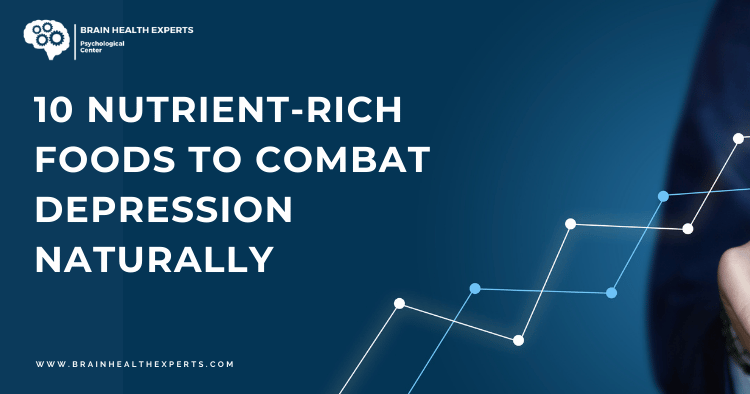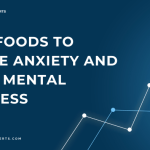- Introduction
- The Link Between Nutrition and Depression
- Nutrient-Rich Foods to Combat Depression
- 1. Fatty Fish
- 2. Leafy Greens
- 3. Nuts and Seeds
- 4. Berries
- 5. Whole Grains
- 6. Fermented Foods
- 7. Dark Chocolate
- 8. Avocados
- 9. Eggs
- 10. Bananas
- Conclusion
- FAQs
Introduction
Feeling down sometimes is a part of life, but if those feelings linger, they can turn into something more serious like depression. While many treatment options exist, natural remedies through nutrition can also play a significant role in improving mood and mental health. This article will delve into ten nutrient-rich foods that can help combat depression naturally.
The Link Between Nutrition and Depression
Research has increasingly shown that what we eat can significantly impact our mental health. Nutrient deficiencies can lead to mood disorders, including depression. According to studies published in Nutritional Neuroscience, diets rich in whole foods, fruits, and vegetables are associated with a lower risk of depression, while those high in processed foods may increase this risk.
For a deeper understanding, check out Harvard Health.
Nutrient-Rich Foods to Combat Depression
1. Fatty Fish
Fatty fish like salmon, sardines, and mackerel are rich in omega-3 fatty acids, essential fats linked to brain health. Omega-3s help reduce inflammation and are critical for neurotransmitter function, which plays a key role in mood regulation.
Nutritional Benefits:
- Omega-3 Fatty Acids
- Vitamin D
- Selenium
“Incorporating fatty fish into your diet just a couple of times a week can make a significant difference in your mental health.”
2. Leafy Greens
Leafy greens like spinach, kale, and Swiss chard are packed with vitamins, minerals, and antioxidants. They are high in folate, a B-vitamin that is crucial for serotonin production, a neurotransmitter that helps regulate mood.
Nutritional Benefits:
- Folate
- Vitamin K
- Magnesium
3. Nuts and Seeds
Nuts and seeds, including walnuts, flaxseeds, and chia seeds, are excellent sources of healthy fats and minerals. They also contain tryptophan, an amino acid that the body uses to produce serotonin.
Nutritional Benefits:
- Healthy Fats
- Magnesium
- Tryptophan
“A handful of nuts or seeds can be a great snack that not only satisfies hunger but also supports your emotional well-being.”
4. Berries
Berries like blueberries, strawberries, and raspberries are rich in antioxidants, particularly vitamin C and flavonoids. These compounds help combat oxidative stress, which has been linked to mood disorders.
Nutritional Benefits:
- Antioxidants
- Vitamin C
- Fiber
5. Whole Grains
Whole grains such as brown rice, quinoa, and oats are rich in complex carbohydrates that help stabilize blood sugar levels. Stable blood sugar can lead to more stable mood swings, preventing the dips that can lead to feelings of depression.
Nutritional Benefits:
- Fiber
- B Vitamins
- Iron
“Swapping refined grains for whole grains can provide lasting energy and a better mood throughout the day.”
6. Fermented Foods
Fermented foods like yogurt, kefir, sauerkraut, and kimchi contain probiotics that promote gut health. A healthy gut microbiome is increasingly recognized for its role in mental health, as it can influence mood and cognitive function.
Nutritional Benefits:
- Probiotics
- B Vitamins
- Antioxidants
7. Dark Chocolate
Dark chocolate, particularly varieties with 70% cocoa content or higher, is rich in antioxidants and can boost serotonin levels. It also contains magnesium, which can help ease anxiety.
Nutritional Benefits:
- Antioxidants
- Magnesium
- Flavonoids
“Indulging in a small piece of dark chocolate can not only satisfy your sweet tooth but also lift your spirits.”
8. Avocados
Avocados are nutrient-dense fruits high in healthy fats, particularly monounsaturated fats. They also contain folate, which has been linked to improved mood and cognitive function.
Nutritional Benefits:
- Healthy Fats
- Folate
- Potassium
9. Eggs
Eggs are a powerhouse of nutrients, including protein, B vitamins, and omega-3 fatty acids. They are particularly high in vitamin D, which has been linked to improved mood and reduced symptoms of depression.
Nutritional Benefits:
- Protein
- Vitamin D
- Choline
“Incorporating eggs into your breakfast can provide a nutritious start to your day.”
10. Bananas
Bananas are rich in vitamin B6, which is essential for the synthesis of neurotransmitters like serotonin. They’re also a great source of carbohydrates, providing a quick energy boost that can help improve mood temporarily.
Nutritional Benefits:
- Vitamin B6
- Potassium
- Fiber
Conclusion
Incorporating these ten nutrient-rich foods into your diet can be a delicious and effective way to support mental health and combat depression naturally. Remember, while nutrition can play a vital role, it is essential to consult healthcare professionals if you’re experiencing persistent depressive symptoms. For more insights on how positive thinking can impact mental health, check out 10 Ways Positive Thinking Boosts Emotional Well-Being.
FAQs
Q: Can a poor diet cause depression?
A: Yes, research suggests that diets high in processed foods and sugar may contribute to the development of depression.
Q: How quickly can diet affect mood?
A: While individual responses vary, some people may notice mood improvements within a few days of changing their diet.
Q: Are there foods I should avoid to improve mood?
A: Yes, try to limit processed foods, sugary snacks, and excessive caffeine, as these can negatively impact mood.
For more information on improving your mental health through nutrition, visit the National Institute of Mental Health.
Incorporating these nutrient-rich foods into your daily meals may help you not only feel better but also enhance your overall well-being. Remember, every small step counts towards a healthier, happier you! For additional strategies that support emotional health, consider exploring 10 Proven Techniques to Boost Your Mental Health Today.





